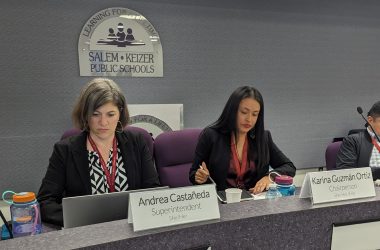 Students organized by Latinos Unidos Siempre urged the new Salem-Keizer School Board to address the mental health needs of immigrant students and stop policies that disproportionately punish students of color at a July 2019 meeting. (Rachel Alexander/Salem Reporter)
Students organized by Latinos Unidos Siempre urged the new Salem-Keizer School Board to address the mental health needs of immigrant students and stop policies that disproportionately punish students of color at a July 2019 meeting. (Rachel Alexander/Salem Reporter)
Hundreds of community leaders, teachers and citizens are calling on the Salem-Keizer School District to end contracts with local law enforcement agencies for police in schools and reinvest the money in education.
The push, led by Salem youth organization Latinos Unidos Siempre, joins similar efforts across the U.S. following a Minneapolis police officer’s killing of George Floyd and subsequent protests over police brutality and racism.
Minneapolis and Portland school districts have ended similar contracts over the past week after calls from local activists, and Seattle Public Schools leaders announced Tuesday they plan to suspend a contract with local police for one year.
Sandra Hernández-Lomelí, director of Latinos Unidos Siempre, an organization serving Latino young people, wrote a letter Monday evening calling for Oregon’s second-largest school district to follow suit.
“We ask the Salem Keizer School District to stand with ALL their students and put the students most at risk of police violence at the forefront of their decision making. For nearly 25 years, LUS has strongly advocated to end the school to prison and deportation pipeline in our school district. While there have been small advances, most of the serious issues have been ignored by our school district leaders,” she wrote.
DOCUMENT: Letter calling on Salem-Keizer to end police in schools
Those signing in agreement include Benny Williams, president of the Salem-Keizer NAACP; Salem-Keizer Education Association President Mindy Merritt, Salem City Councilor Jackie Leung and hundreds of citizens who include parents, former Salem-Keizer students and teachers. Also signing are two members of the district’s budget committee: Levi Herrera-Lopez, executive director of Mano a Mano, and Adriana Miranda, executive director of Causa.
Police presence in schools expanded significantly in the early 2000s following high-profile school shootings. By 2010, about half of U.S. public schools had an assigned police officer, according to an Arizona State University report.
Salem-Keizer has contracts with the Salem Police Department, Keizer Police Department and Marion County Sheriff’s Office to station 11 officers and deputies at district schools. Six of those officers and deputies are based at each of the district’s six comprehensive high schools. The other five are assigned to one or two local middle schools.
DOCUMENTS: Salem-Keizer contracts with Salem police, Keizer police and Marion County Sheriff’s Office
The contracts cost the district $963,778 so far this school year, district spokeswoman Lillian Govus said. It’s a small fraction of the district budget, less than one-tenth of one percent, but would be enough to hire about eight additional counselors for schools.
Hernández-Lomelí and other organizers and young people involved in Latinos Unidos Siempre have frequently spoken at school board meetings in recent years asking board members to address the “school-to-prison pipeline,” a term used to describe how students of color are more likely to face discipline at school than their white peers and may end up facing criminal prosecution.
To date, the board has done little publicly to address those concerns other than to thank students for sharing their thoughts following testimony.
Hernández-Lomelí said the recent police killings of Floyd and Breonna Taylor “created an urgency” to raise the issue again.
“It’s about preventing more tragedies because black and brown students are not safe with police in schools. We’ve always known this,” she said in an interview.
Lt. Debbie Aguilar oversees the Salem Police Department’s school resource officer program and said those officers provide physical and psychological safety if an emergency, like a school shooting, happened.
She said if the program goes away “you’re going to lose a lot, especially as it comes to that mentoring, education, just that connection piece.”
Salem’s school resource officers use a model called the triad, which primarily focuses on informal counseling, then education, then law enforcement.
“We truly believe in working with parents and working with school administrators on trying to decide what is the best way to handle violations and crimes at the lowest level possible, so we don’t get into this school to prison pipeline,” Aguilar said.
If an officer that students interact with on a day-to-day basis is no longer there, Aguilar said officers without a connection to the school or knowledge of the triad approach will respond to incidents.
Marion County Sheriff’s Office spokesman Jeremy Landers said the goal of having a school resource officer is to make schools safer and develop a rapport with youth.
“Our SRO winds up interacting with students and parents about a variety of issues ranging from child abuse, drug use, attendance, safety and etc. SRO programs provide a mechanism for students to get to know a deputy or police officers as well as an opportunity for the SRO’s to learn about the community members they are working with,” he said in an email.
He said discontinuing the program would remove one of the most widely accessible ways kids are able to communicate with law enforcement in a constructive environment.
Dozens of people have signed up to speak at the Tuesday, June 9, school board meeting about the issue. Superintendent Christy Perry plans to share her thoughts as well.
While the school board could vote to terminate the contracts, board action is not required to do so. Perry could end them without board approval, a step Portland Public Schools Superintendent Guadalupe Guerrero took last week.
Govus, the district spokeswoman, said Perry and district leaders will seek a community discussion going forward about how to proceed with officers in schools before taking any action. That discussion will include Latino, Black, Native American and Pacific Islander community members as well as representatives from law enforcement agencies.
Tuesday’s school board meeting begins at 6 p.m. and will be broadcast live on YouTube and CCTV channel 21 in English, with a Spanish translation posted online the following day.
SUPPORT SALEM REPORTER’S JOURNALISM – A monthly subscription starts at $5. Go HERE. Or contribute to keep our reporters and photographers on duty. Go HERE. Checks can be sent: Salem Reporter, 2925 River Rd S #280 Salem OR 97302. Your support matters.
Contact reporter Rachel Alexander: [email protected] or 503-575-1241.









